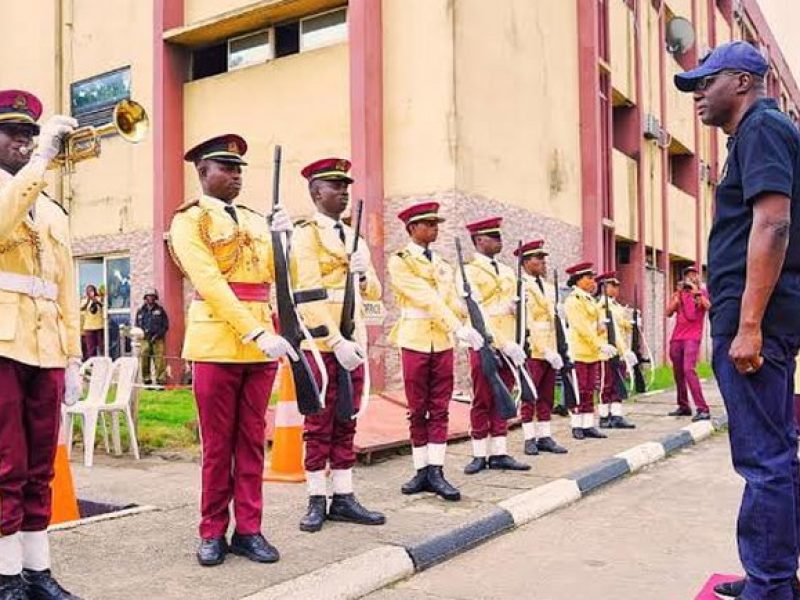Aliko Dangote, Africa’s richest man and founder of Dangote Industries Limited, has formally filed plans to construct what promises to become Nigeria’s deepest—and likely largest—private seaport at the Olokola Free Trade Zone (OKFTZ) in Ogun State. Announced in March 2025 during a high-level visit to Governor Dapo Abiodun, the project marks a major revival of Dangote’s earlier vision for Olokola, shaped by the state’s rejuvenated investor-friendly climate.Aliko DangotePhotographer: Victor J. Blue/Bloomberg
A Strategic Re-Entry into Ogun
Originally, Dangote’s plans in Olokola—including a refinery—were abandoned due to policy roadblocks. Under Governor Abiodun’s administration, Dangote has, however, returned to resume efforts in both Olokola and Itori. He expressed that his company’s Itori factory had been demolished twice under prior regimes; now with supportive policies, they’re back—and notably committed to Olokola.
This policy shift has not only encouraged Dangote’s re-engagement, but also spurred investment in other large-scale projects like an enlarged cement plant in Itori and a new logistics corridor featuring a 100‑km Sagamu‑Papalanto‑Ilaro‑Obelle road—all aimed at unlocking Ogun’s industrial potential.
The Ambitious Scope of the Port
According to multiple reports, the planned seaport will be Nigeria’s largest, ultra-modern, deep-sea facility, situated within the Olokola Free Trade Zone. While Dangote hasn’t released exact specifications publicly, projections suggest it may exceed the capacity of Lekki Deep Sea Port, which handles about 2.5 million TEUs per year and accommodates 277‑meter container ships.
Positioned near the Ogun–Ondo coastal border, Olokola’s port will provide a vital alternative gateway for southwestern and midwestern Nigeria. It’s expected to ease chronic congestion at Lagos’ Apapa and Tin Can Island ports and reorient logistics away from overburdened infrastructure.
Although financial and timeline details remain under wraps, all descriptions frame this as a “multi‑billion‑dollar,” ultra-modern deep-sea maritime hub that would significantly expand Nigeria’s port capacity .
Cementing Ogun’s Industrial Edge
In tandem with the port, Dangote is expanding cement production in Ogun. Two new lines at Itori will add 6 million metric tons per annum (Mta), joining the existing 12 Mta plant at Ibeshe—bringing Ogun’s cement capacity to a remarkable 18 Mta. That’s enough to make the state the largest cement producer in sub‑Saharan Africa.
This integrated industrial plan aligns with Dangote’s broader vision of self‑sufficiency in major sectors: refining crude, producing fertilizers, cementing infrastructure—and now logistics. It also cements (pun intended) Ogun’s role as a manufacturing and export hub.
Government, Community, and Economic Impacts
Governor Abiodun has welcomed Dangote’s return, noting that its approval makes Ogun a more attractive destination for major investors. The government has also backed related infrastructure—most visibly a major road corridor and local community development efforts under a federal tax‑credit initiative .
Economists predict that each billion dollars in infrastructure can generate around 22,000 jobs when including indirect sectors.. By moving industrial activity toward Ogun, the port could distribute economic growth more evenly across Southwestern Nigeria and significantly boost the state’s Internally Generated Revenue (IGR).
For local communities and the region, the port and cement expansion are set to propel a surge in manufacturing, logistics, and foreign direct investment. With thriving host communities in Yewaland already benefiting from cement and road projects, the ferried economic benefits could reshape livelihoods.
Region-Wide Implications
A privately operated deep-sea port at Olokola positions Ogun—and by extension, Nigeria—as a logistics powerhouse in West Africa. The project would offer a critical link in the West African transport corridor and could indirectly reduce shipping costs and clearance delays—a boon for exporters across the region.
Drawing parallels, the Lekki Port began decongesting Lagos ports and setting a benchmark in automation and capacity. Dangote’s Olokola undertaking promises to continue that trajectory, establishing a national shift toward decentralized maritime infrastructure.
Roadmap & Challenges Ahead
Details are still emerging—Dangote hasn’t provided projected cost, timeline, or technical specifications. But multiple sources confirm that it’s positioned as Nigeria’s largest port venture, integrated with upgraded transport corridors and manufacturing facilities .
Success hinges on navigating regulatory approvals, integrating the port with road and rail networks, and ensuring cooperation from both Ogun and federal authorities. Governor Abiodun has pledged full state cooperation, but any deviation could derail the momentum.
Conclusion
Aliko Dangote’s filing to build Nigeria’s deepest seaport at Olokola marks a potentially transformative shift in the nation’s industrial and economic landscape. With a host of integrated projects—port, cement plants, road infrastructure, and free trade incentives—support from Ogun State, and the promise to unclog Lagos ports, the initiative may redefine Nigeria’s role in the global logistics corridors.
Much remains to be seen—timelines, funding details, and technical specs—but the potential impact is clear: a new maritime gateway, a cementing of Ogun’s industrial legacy, and a bold step toward decentralising Nigeria’s economic growth.
As Dangote says, “we are back”—and the return may herald a new chapter in West Africa’s infrastructure and industrial evolution











